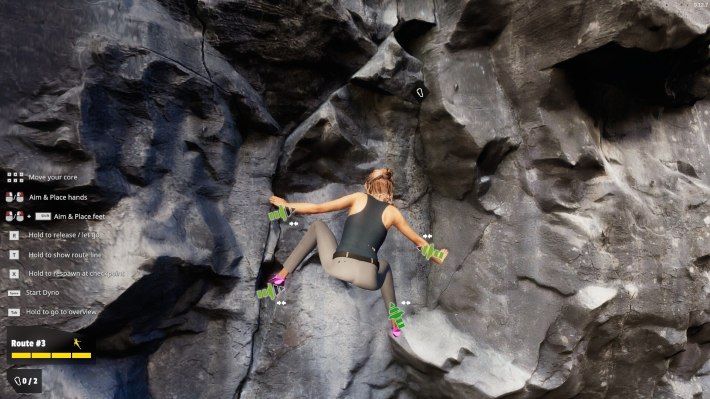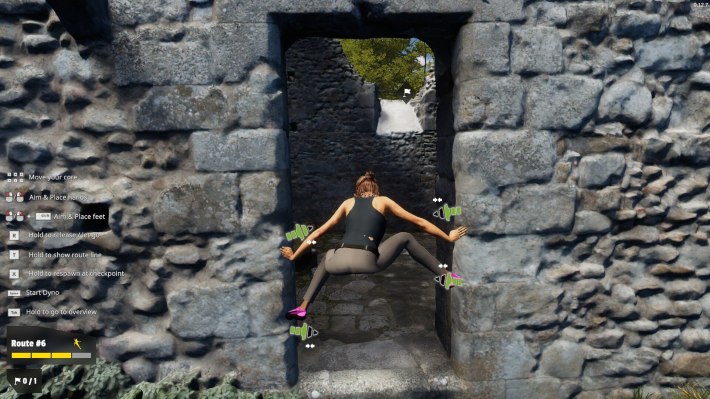Around Aftermath’s launch, I wrote about climbing game Jusant and lamented that, as much as I liked it, it wasn’t quite my ideal climbing game. In the comments, a few of you recommended an early access game called New Heights, which I will admit I completely forgot about until my buddy Mark Serrels reminded me of the game on Twitter recently. I played it a bunch over the holiday weekend, and while it has some flaws and is still in development, it feels a lot like the climbing game of my dreams.
New Heights: Realistic Climbing and Bouldering is, let’s face it, not a terribly sexy title, and it’s not a terribly sexy-looking game, with only one character model and a less-than-eye-catching visual style. There’s no storyline or mountaineering narrative; instead, the game is mostly its complicated mechanics, where you free solo routes of various difficulties by using your left and right mouse buttons to control each hand, mouse+shift to control each foot, and WASD, Q, and E to control your weight placement and body positioning. You climb real world locations that include rock faces and boulders, but also what I found to be a slight over-abundance of ruins and old buildings, though you might be more keen on those location choices than I am.
I put all this sort of negative stuff up front to explain why it might be an easy game to make assumptions about and skip, especially in the crowd of early access. But you totally shouldn’t miss it, especially if you're a climber.
Once you wrap your head around the controls, which you can practice in a tutorial area styled like a climbing gym, you’re set loose to do what honestly feels the most like actual climbing of any climbing game I’ve played. The quality of your holds and hand and foot placement is indicated by directional arrows that change color depending on your grip direction and body placement. Too much bad positioning, indicated by yellow or red arrows as opposed to green, will start to drain your stamina meter until you fall. To deal with all this, the techniques that worked for me are the ones that best work for me in real life: bringing my feet up high, shifting my weight around, keeping my body close to the wall. Unlike other climbing games where you just navigate between holds or perform dramatic mid-air moves, New Heights requires full awareness of your virtual body and a careful, systematic approach.

It's fascinating to experiment with turning a bad hold into a good one (or vice versa) by moving my body around, and I found myself thinking and navigating much the way I would in real life–with the added bonus that the character is much stronger and seemingly taller than me, letting me climb things I can only dream of in real life. Long climbs feel like thoughtful, harrowing adventures the way my favorite roped routes do, with safer areas and sketchier areas, and the bouldering routes are surprisingly tough, the way bouldering often is. There are speed-based leaderboards whose scores tempt me to think about how I can improve my climbs, and even a dyno mechanic that’s thrilling to execute in the middle of a route. Routes of different levels feel meaningfully harder from each other, and there are player-created areas and routes as well.
There are places where the simulation falls short, as perhaps it must for something that must be so complicated to make work. The physics bugged out on occasion, twisting my character into horrifying shapes or letting my limbs clip through the wall. I couldn’t do some things that feel instinctive for real life climbing–in one route, I wanted to do something with my foot on an arete that the game couldn’t simulate, and it doesn't quite seem to know what to do with mantling or moments where you end up on flat ground mid-route. Moves I would use in real life, like flagging or drop knees, felt more like screwing around to see if I could recreate them than vital techniques. One of the biggest challenges, as some Steam reviewers note, is that the textures don’t always correspond to the quality of a hold: something will look like a ledge or grip only to not be, which means finding a good hold is sometimes less a matter of using your eyes and more wagging your mouse around until an arrow turns green.

But a lack of certain realism in a game that touts realism isn’t a dealbreaker for me. As I wrote about Jusant,
When I imagine what I think a “true” climbing game would be, I inevitably conjure up some kind of inelegant, QWOP-esque nightmare that would force you to navigate foot and hand placement, limb tension, stamina, pathfinding, and your own emotions in a way that couldn’t possibly be fun, much less technically possible.
Developer Wikkl Works seems to recognize the challenging boundaries between what’s realistic, what’s technically possible, and what’s fun. In real life, I would have hooked my foot around that arete, but in a game, controlling ankle movement and simulating using the top of the foot instead of the bottom would be a nightmare for both player and programmer. New Heights picks the right things to get technical about–your contact points with the wall and your whole body’s position in relation to them–to make a game that simulates so much of the strategy and feel of climbing while still simplifying things enough to be approachable and, crucially, enjoyable.
As a sadly lapsed climber who’s struggling to get back into shape, New Heights gave me so much of the pleasure I get from real climbing. It manages to be realistic without being overly fiddly or complicated, and what it lacks in visual or narrative flair it makes up with through a clear love of climbing and the places where you do it. I’m excited to see how it keeps developing through early access and so glad I took a chance on it. If you’re a climber, I think you’ll have a blast with it; if you’re not, it might give you something like a taste of one of my favorite sports.


